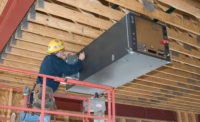To help combat mercury pollution in the U.S., major thermostat manufacturers established the Thermostat Recycling Corp. (TRC) in 1998, and stopped making mercury-containing thermostats altogether in 2006, though millions of those units are still in service.
While having mercury thermostats in homes and buildings across the U.S. is not necessarily a bad thing, controlling what happens to those thermostats after they’ve been pulled off the wall is vital in keeping the powerful neurotoxin out of the environment. And since HVAC contractors and distributors are on the frontline, they are the first, and perhaps most important, step in making sure these thermostats never end up in a landfill.
Mercury 101
Mercury, a neurotoxin associated with impaired neurological development in fetuses, infants, and children, is being found in increasingly large amounts in the environment, due in part to improper disposal of mercury-containing products, including thermostats. Humans, especially pregnant women and young children, are most commonly exposed to the powerful toxin by ingesting fish or shellfish that contain mercury absorbed from the environment, according to the U.S. Environmental Protection Agency (EPA).
“It adversely affects childhood development the same way lead would,” explained David Lennett, senior attorney at the Natural Resources Defense Council (NRDC). “There are IQ changes associated with mercury exposure in kids.”
To help keep mercury thermostats away from landfills, several thermostat manufacturers came together to create the TRC 15 years ago. The organization often partners with state-level programs and other organizations to collect thermostats. To participate, distributors and wholesalers need only to sign up to serve as a collection point and pay a one-time nominal fee; then, contractors and homeowners may drop off old thermostats to be packaged and shipped for recycling.
“The best thing we can say is that we’re working ourselves out of business,” said Mark Tibbetts, executive director, TRC. “We don’t know how much longer we are going to have to do this, but our goal is to turn the lights off on this program.”
Is It Enough?
Despite the known negative effects of mercury pollution, mercury thermostat recycling is mandated in only a handful of states. Lennett, who coauthored the April report, “Turning up the Heat II: Exposing the Continued Failures of the Manufacturers’ Thermostat Recycling Program,” suggested that the TRC is not doing enough to educate contractors about mercury thermostat recycling.
“It should be working better than it is,” Lennett said. “I have to believe that manufacturers are doing a much better job selling new thermostats than encouraging contractors to recycle old thermostats. I wish they were putting the same effort into informing contractors of the recycling process.”
But Tibbetts argues that voluntary collection programs can be very successful and that TRC is doing all it can to educate distributors, contractors, and homeowners. He added that it is difficult to assess how effective the program truly is due to a lack of accurate data.
“We don’t know what percentage we’re capturing,” Tibbetts said. “There are reports that claim to know, but the science is weak. How do we assess the program if we don’t have good and accurate data?”
Tibbetts said one study showed 20-50 percent of thermostats in California may contain mercury. “That’s a huge range,” he said. “We don’t know. We don’t know how much longer we’re going to have to do this. Every day, there are fewer of them out there.”
HVAC Industry’s Role
Both Tibbetts and Lennett agree that contractors and distributors are incredibly important in the recycling process, since they are the ones physically removing the thermostats, collecting them, and then shipping them off for recycling.
“Nobody will dispute that contractors need to participate in this,” Lennett said. “The question is whether that will happen enough on its own to really make the numbers work.”
“We need wholesalers to collect them and contractors to bring them back to the supply houses,” Tibbetts said, adding that “a big part of what we’re trying to do is connect with the distributors.”
To help encourage mercury thermostat recycling, Heating, Air-conditioning, and Refrigeration Distributors International (HARDI) partnered with TRC last year to launch the Big Man on Planet (BMOP) competition. This year’s competition kicked off in May and runs until Oct. 31, with the winner announced at HARDI’s annual conference in December.
“It’s important for HARDI and HARDI members to play an active role in this competition because it gives members an opportunity to demonstrate their commitment to the environment,” said Kelly Kantor, marketing manager at HARDI. “We strongly support TRC’s mercury thermostat mission in order to protect the environment and keep as much mercury out of the waste stream as possible.”
Last year, Houston-based Johnson Supply won the BMOP contest by turning in more than 1,200 mercury-containing units. This year, they’re hoping for a repeat performance, said Sony Mendiola, vice president of sales and marketing for Johnson Supply.
“We think it’s the right thing to do, especially since a lot of the contractors look to us for support and guidance. They expect us to do the right thing,” Mendiola said. “We feel we need to continue to be that leader in the industry for our customers.”
Tibbetts said TRC supports state-level legislation if it is introduced, though he said he would like to see a provision for contractors to turn them in and for wholesalers to act as a collection point.
“We won’t need a mandatory program if we can make the voluntary program work,” he added. “It’s easier and cheaper. I think all of us can agree that a voluntary program is better for the industry.”
The TRC was founded by thermostat manufacturers Honeywell, White-Rodgers, and General Electric and is now backed by 30 manufacturers across all 48 contiguous states. For more information, and to learn how to obtain a mercury thermostat recycling bin, visit www.thermostat-recycle.org.
Publication date: 9/23/2013
Want more HVAC industry news and information? Join The NEWS on Facebook, Twitter, and LinkedIn today!












